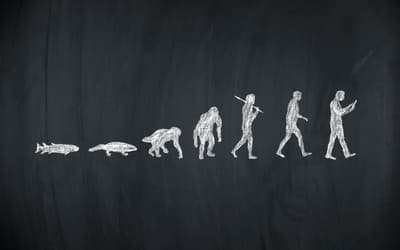The views expressed in this paper are those of the writer(s) and are not necessarily those of the ARJ Editor or Answers in Genesis.
Abstract
Scientific efforts to explain belief formation have increased, and explanations are nothing less than bewildering. The aim of this paper is to show why the recent claim that “conflicting networks” in the brain that explain belief and unbelief in God cannot be true. Firstly, why someone believes in God is a question about a person’s reasons and evidence, and not about what is going on his brain. Secondly, a belief, and believing something or someone, is not what scientists think it is: it is not an act of either a mind or a brain, and it is neither a process nor a state of either the mind or a brain. And thirdly, the nature of the conflict between evolutionists and biblical creationists, the source of belief and unbelief from the perspective of Scripture, and a brief description of what it means for a biblical creationist to believe in God should make scientists realize that their Darwinism, materialism and/or atheism is an inadequate conceptual framework to explain belief or unbelief in God. There is no such thing as conflict between brain parts or science and religion; only between persons subscribing to different worldviews.
Introduction
Psychological and neuroscientific research have established an unquestionable truth: all religious belief and behavior depend on a functioning brain. But so do, for example, bodily movements, breathing, sleeping, eating, and loving someone. However, under the influence of Darwinism, materialism, and/or atheism, what a brain is and does led far too many people to accept the following questionable logic: perceiving, thinking, believing, knowing, loving, or reading depends on a functioning brain; therefore, the brain is a perceiver, thinker, believer, knower, lover, or a reader. To see what is questionable about the logic is to consider what a belief, and believing something or someone, is. If it is not what these researchers think it is, then not only is the interpretation of their research results conceptually confused; their logic is also unintelligible, as I hope to show it is.
Notwithstanding these problems, scientific efforts to explain belief formation have increased over the last two decades (Connors and Halligan 2015; Seitz and Angel 2012; Sugiura, Seitz, and Angel 2015). Most remarkable and bewildering about these efforts are the explanations of belief in God,1 atheism, and the controversy between evolutionists and creationists. This will be explained in the following paragraphs.
In the first place, while some scientists think that religious beliefs are caused by brain dysfunction, such as epilepsy (Dewhurst and Beard 2003; Persinger 1983), others attribute religious beliefs to a “God module” (Ramachandran and Blakeslee 1998, 175−177, 179−188) or “God gene” (Hamer 2004) in the brain that has evolved over millions of years.
Perhaps the most basic and general reason for the interest in religion is the rationality of people’s religious beliefs (Thurow 2013, 78), including those of creationists. “Ardent pro-evolutionists,” according to Wolff-Michael Roth (2010) from the University of Victoria, “sometimes charge that fundamentalist creationists are not subject to reason and that they are not open to the facts and rational explanations thereof” (Roth 2010, 8). John Wilkins (2011) from the University of Sydney finds it difficult to understand why “people become creationists when the bulk of modern thought depends so heavily on science?” (Wilkins 2011, 208). These writers suggest that creationists are irrational. However, an increasing consensus among scientists, based on their scientific research (Zuckerman, Silberman, and Hall 2013), is that Christians who believe in God, angels, the soul, heaven and hell are stupid, or, at least, less intelligent on average than atheists (Bertsch and Pesta 2009; Kanazawa 2010), less reflective (Pennycook 2014), less analytic in their thinking (Pennycook et al. 2012), and make more errors in logical reasoning than skeptics and atheists (Pennycook et al. 2013). For Gordon Pennycook et al. (2012), worldwide “supernatural belief” is, therefore, not only unsurprising (Pennycook et al. 2012, 342) but also explains why belief in a supernatural God is counterintuitive: it violates a “naturalistic worldview” (Pennycook et al. 2012, 343).
To explain the presumed irrationality and lack of cognitive (intellectual) abilities of believers in God, scientists invented a “reoccurring strategy” among themselves: they divide “the mind into separate parts” and then postulate that they are in conflict or tension (Mugg 2015, 88). Roughly, the logic is as follows: people make decisions or judgments involving spontaneous feelings (often called “intuitions”) and effortful logical reasoning (analytic thinking); results are often inconsistent; therefore, there are two qualitatively distinct “systems” or “processes” in the brain that is the cause of this.2 This strategy and logic is also clearly evident in yet another reason for the increased interest in religion: to explain atheism.
Psychologists Will Gervais and Ara Norenzayan are from the University of Kentucky and the University of British Columbia, respectively. They are just two of many scientists whose studies indicate that analytical thinking “promotes religious disbelief” and is able to “override” religious beliefs, such as that the universe and the things in it have been created for a purpose, that there is life after death, and that human beings are not just material beings (Gervais and Norenzayan 2012, 493−496). Why specifically “analytical thinking?” To them the answer is uncomplicated: analytical thinking, which they associate with the “scientific enterprise,” “encourages a materialistic understanding of the world” (Norenzayan and Gervais 2013, 23).3 Whether scientists who are Christians are exceptions to the rule or serve as counter-evidence to their claim is unfortunately neither considered nor discussed.
Anthony Jack, an experimental psychologist from Case Western Reserve University, and his collaborators very recently claimed that there are two distinct “networks” in the brain that are in “tension” or “competition” (Jack et al. 2016, 2, 3ff.), and this tension explains why some people belief in God and others not. Simply put, when someone believes in God, then the network associated with science, analytic thinking, and naturalism/materialism “suppresses” the network associated with religious belief, emotion, and morality, and vice versa (Jack et al. 2016, 2−5, 12−14).
From the claim that “tension” or “competition” between parts in the brain is the origin of belief and unbelief is a short step to claim that the brain is also the cause of what many people construe as a “war” between science and religion.4 Despite having been shown to be the mythical legacy of a group of thinkers in the nineteenth century whose aim it was “to place a secular science into the center of cultural life in Victorian England” (Harrison 2010, 27), the idea persists. A case in point is a recent article in ScienceDaily (Anonymous 2016). Referencing Jack et al. (2016) as its source, the article states that the conflict between science and religion “is perhaps most visible today in the arguments between evolution and creationism.”
In the rest of this paper I will attempt to show that the human brain is neither the origin of belief or unbelief in God nor the cause of the conflict between evolutionists and biblical creationists.5 In short, the conflict thesis is not only confusing but also confused. First, I will clarify the difference between an empirical and conceptual question in order to identify the roots of the confusion. I will then employ a conceptual analysis as a tool to clarify the concept of belief and show that a belief and believing something or someone are not acts of any sort, and a belief and believing are also not a state or process of either the mind or the brain. To state the same point differently, my interest is not scientific or historical, but conceptual and analytic, and my concern is with analyzing a feature of a person’s psychological powers. I will then turn to the Christian Scriptures to clarify the nature of the conflict between evolutionists and creationists, identify the source of unbelief, and then indicate what it means for a biblical creationist to believe in God. Taken together, the arguments should lead scientists to new insights, and hopefully, new beliefs.
Empirical Questions and the Roots of Confusion
Empirical truth claims are about facts, and hypotheses are confirmed or disconfirmed through experiments in accordance with certain methods. To take just one example, in cognitive neuroscience, scientists are interested in correlating brain functions with, for example, the thinking, reasoning, believing, judging, or emotional responses of a person performing certain tasks while in a scanner. Such work is assumed to provide insight into the connection between the brain and behavior. However, when scientists fail to distinguish between conceptual questions and empirical questions, and when they attempt to address empirical problems without conceptual clarity, then wrong questions are bound to be raised and research misdirected.
Neuroscientist Maxwell Bennett and philosopher Peter Hacker state the issues as follows:
Conceptual questions antecede matters of truth and falsehood. They are questions concerning our forms of representation, not questions concerning the truth or falsehood of empirical statements. These forms are presupposed by true (and false) scientific statements and by correct (and incorrect) scientific theories . . . [C]onceptual questions are not amenable to scientific investigation and experimentation or to scientific theorizing. For the concepts and conceptual relationships in question are presupposed by any such investigations and theorizings. Our concern here is . . . with distinctions between logically different kinds of intellectual inquiry . . .
For any unclarity regarding the relevant concepts will be reflected in corresponding unclarity in the questions, and hence in the design of experiments intended to answer them. And any incoherence in the grasp of the relevant conceptual structure is likely to be manifest in incoherences in the interpretations of the results of experiments. (Bennett and Hacker 2003, 2; emphasis in the original)
There are at least two reasons why we should think the empirical inquiry of Jack et al. (2016) yielded erroneous results. First, their question “Why do you believe in God?” requires a different reply than “Where in the brain is the amygdala or hypothalamus?” To ask someone why he believes in God is to inquire about his reasons, grounds (evidence, facts), or the source(s) of his belief in God. And because the question is also conceptually connected to a host of other concepts, it cannot be adequately answered without an inquiry into the logical relationship between a Christian’s beliefs and those concepts, as we shall shortly see.
The second main reason why we should think Jack et al.’s scientific inquiry yielded erroneous results is because they confuse a person, who has a mind, with a brain. In other words, they confuse the reasons a person believes in God with where they think a person believes, that place being the brain. However, where a person is who believes in God is any one of the places where he can be bodily located; but a brain, which is in a skull, can never be one of these. The error is most evident in the persistent ascription of psychological properties of a person to a brain (Joubert 2015). Simply put, it is a category mistake: a person is not a brain. Or, so I will argue.
These errors have two major roots, which have already been alluded to. Philip Robbins and Anthony Jack describe the first thus: “Cognitive science is shamelessly materialistic. It maintains that human beings are nothing more than complex physical systems, ultimately and completely explicable in mechanistic terms” (Robbins and Jack 2006, 59). In this view, the mind is simply “the functional organization of the brain” (Piccinini 2010, 287), which is highly problematic. For example, Gervais claims that people’s belief in “empirically unverifiable gods,” of which the “Judeo-Christian God is a paradigmatic example of a supernatural agent” (Gervais 2013, 385), can be explained by their belief in other “unobservable entities . . . called minds” (Gervais 2013, 380). But if minds are unobservable “entities,” and are by definition imperceptible, then it becomes wholly obscured how the mind can also be the observable “functional organization of the brain.” Furthermore, even if the invisible God of Christians cannot be observed, it does not mean that His existence cannot be verified from His creation or rationally defended.
The second source of error and confusion is naturalism: God is not necessary to explain the world, the evolution story is the only explanation for life on earth, and the brain explains human psychological abilities and powers. We are told, for instance, that any explanation of the “notion of function” needs to be, or must be, “naturalistic” (Piccinini 2010, 287); and “function,” naturalistically construed, refers to the “mental processes in the human brain” (Driver, Haggard and Shallice 2007, 757). According to the latest update of Wikipedia (2016), “Mental process or mental function are terms often used interchangeably for all the things individuals can do with their minds. These include perception, memory, thinking (such as ideation, imagination, belief, reasoning, etc.), volition, and emotion. Sometimes the term cognitive function is used instead.” For now, it suffices to make three observations about the difference between a person, a mind, and a brain.
Firstly, a brain, in contrast to a person, has no sense-organs, it is not pain-sensitive, and has no mouth with which to speak. It follows, it is not the sort of thing that can perceive, form beliefs, or answer questions. In contrast to a person, it has no ears to hear and no capacity to listen (i.e., able to comply with a request to obey, or disobey, an order or instruction). If it could, then it would have been possible for one brain to teach another brain how to ride a bicycle.
Secondly, it is coherent and intelligible to think or say that a person can be in two minds (cf. the “double-minded” person in James 1:8) when indecisive or unsure, but incoherent and unintelligible to think or say that a person can be in two brains. Likewise, a person may not be in his right mind when distraught, but he can never be in his right brain. Also, a person can, but his brain cannot, give another person a piece of his mind, and a person, as opposed to a brain, can be broad- or narrow-minded, and only persons can, but brains cannot, be of the same mind (cf. Philippians 2:2).
Finally, a person has a mind and is an agent, but a mind is not. It is coherent to think and say that a person is able to make up his mind, but incoherent to think and say that a mind has a mind to make up. To have a mind is to possess a range of capacities, abilities or powers, such as perceptual abilities, an intellect (i.e., the power to reason, to draw inferences and conclusions, and to act for reasons), to think of or about something, to form beliefs, learn, acquire knowledge and information, evaluate evidence, understand, comprehend, and explain something, and make judgments about things being right or wrong and good or bad; it is to have the ability to deliberate, choose, and decide what to do and being able to change one’s feelings, desires, and attitudes. And a person who has a mind also has the power to act at will and rationally. All these abilities are powers that a person who has them can exercise.
I will now proceed to clarify what a belief is, and then show that a belief and believing is not what scientists think it is. Again, my interest is conceptual and analytic, and my concern is with analyzing a feature of a person’s psychological powers.
Belief and Believing
Belief, and believing something or someone, are conceptually connected to a wide array of concepts, such as knowledge, thinking, reason, rationality (reasonableness and reasons, evidence, facts), judgment, feeling, truth, morality (right and wrong, good and bad, virtues and vices), desires (needs and wants), faith (faithfulness and trust), love, hope, and action. Because of space constraints, I shall briefly indicate just a few of the various relationships between belief and the other concepts, some in this section, and some in the next two.6
Belief and knowledge
Beliefs, as thoughts and memories (i.e., knowledge retained) are not perceptible objects. No person on earth can provide us with an account of their weight, color, shape, length, or width. Most importantly, they are not representations of anything in the mind or in a brain. A photograph may represent a child, a painting, a landscape, and I represent my beliefs in the words and sentences I use. A “belief” is something a person has when he believes something to be so, and to have a belief is believing something to be so. A belief may be typical, and may be firmly, tentatively, or passionately held, but what is believed, as opposed to the believing of it, cannot be typical, firm, etc. The essential characteristic or point of a belief can, therefore, be stated as follows: a person believes things are so and not that they are otherwise.
A person can believe, know, hope, and love something, and when he adds the term “that” as in “I believe that . . .,” then “that” specifies the content of his belief, knowledge, hope, and love. And the content are the answers he gives in response to what he believes, knows, hopes for, and so on. Believing something and believing a proposition are not the same. Believing something focuses on how things are in the world and the belief is true or correct if things are as someone believes them to be. To believe a proposition (claim, story, or conjecture) is to believe what is said by someone about things that have been or are (i.e., that the claim, story, or conjecture is true). In contrast to a belief that can be true or correct, believing may be wise, foolish, or thoughtless if it is wise, foolish, or thoughtless to believe something or someone.
A person can only say that he knows, recognizes, or be acquainted with something (or someone) if it (or the person) exists, and can know, recognize or remember that things are so only if they are. So if someone notices and is aware of something, then there must be something that he notices, is aware or is conscious of. These points illustrate why noticing, knowing, remembering, being aware and conscious of something or someone, desires, needs and wants, and thought are conceptually connected to facts. But what a person knows, when he knows that things are so, is precisely what he believes when he believes that things are so. And if, for instance, the Apostle Paul knew that sin and death came into the world through the rebellion of Adam (Romans 5:12−21), and I believe that, then what I believe is precisely what he knew to be so.
Belief and thought
To say (state, assert, claim) “that things are so” is not a description of a person’s belief or thought; it is a specification of a person’s belief and his thought. It specifies what the person believes and thinks. It is also not a description of a fact, but an expression or statement of a fact (that is what he believes), and may be described, for example, as rational, foolhardy, or deplorable. A true description of something consists of a statement of facts. Put differently, belief and thought are made true by facts. Hence, beliefs are verified by finding out how things are or were in the world, not by inquiry into a brain!
Belief and truth
Truth and falsehood are the values of propositions, claims, suppositions, conjectures, statements, assertions, declarations, reports, confessions, allegations, rumors, and histories. Someone’s beliefs about the world can be said to be right (correct) or true, and if things are not as he believes them to be, then his beliefs are wrong (incorrect, mistaken) or false; and what is true or false about a belief is what a person believes. A person may come to believe something falsely when he is overhasty, when he fails to examine the evidence, or when the source of his information is at fault.
When we are interested in knowing whether another person believes something to be so, our knowledge can rest on several kinds of evidence, but mainly his experiences, and what he says and does. Our assertion about what he believes is not an inference from the evidence, however; it is the consequence of the exercise of our perceptual and recognitional ability, capacity, or power—we can see the fear in his face, we can hear him say he saw a large snake on the lawn, and we notice he is making a call. If our claims are challenged, then they can be justified by reference to the evidence: his facial expression, demeanor, tone of voice, behavior, or actions.
Belief, feeling, reason and rationality
A rational person reasons from premises he takes to be true to conclusions supported by the premises, and premises are true or false, and conclusions correct or mistaken. A person also reasons from what a person believes or knows to be so, and believes or knows the conclusions he derives. It is reasonable to believe something that is adequately supported by reasons, and it is reasonable to withhold belief from something that lacks adequate support. Not only are there different kinds of reasons for believing something or someone, but also different sources from which a belief can be derived and different ways (i.e., the manner) in which a person can come to believe something (readily, hesitantly, reluctantly; cf. Thomas in John 20:24–29).
A person (not a brain) can conceal his beliefs, but not suppress them, for unlike agitation, depression, or irritability, beliefs are not feelings. And if he is unsure whether he feels anxious or depressed, he can reflect on his actions, thoughts, or responses to other people and their reactions. But if he is unsure whether he believes something, he can reflect on the reasons or evidence for what he believes.
Although it is arguably the case that all of a person’s beliefs are logically related to each other, and the relation expressed as logical, coherent, and consistent, it would be mistaken to think there are things such as degrees of belief. If I believe that Rose will win the marathon today and you believe it is only possible or probable, then I have more faith than you but not more belief. A person may feel sure, certain, and convinced that things are so, but not believe sure, certain, or believe convinced. When we refer to a belief as strong or faint, passionate, obstinate, tentative, half-hearted, wavering, hesitant and so on, we do not signify degrees of belief, but degrees of confidence, conviction, or tenacity. A belief that is tenaciously held is not a “greater” belief but only one that is less readily surrendered. A belief can, therefore, be defined as follows: A belief is what a person believes about the world or a person to various degrees of confidence or conviction. It is because it is a person’s confidence or conviction that may wax or wane.
To believe in aliens and God is to believe that there are aliens and that God exists. But to believe, for instance, in evolutionism and materialism is not to believe it exists; it is to subscribe to the presuppositions and assumptions of those who are evolutionists and materialists. And to say of someone that he believes in justice, mercy, kindness, and truth is not to describe his beliefs or faith, but his moral commitments.
What a person believes can be his reason (not cause!) for his reasoning, feeling, and acting in a certain way. And both believing and feeling something to be so can be rational or irrational, and reasonable or unreasonable. Good reasoning is exhibited when conclusions are justified by the evidence and the reasons from which they are derived. And reasoning is poor or bad when conclusions are unjustified, when conclusions that are justified are not drawn, or where no conclusions are drawn where they are justified. Likewise, believing and feeling something can be unreasonable if, on discovering that the evidence for believing or feeling what someone believed or felt was wrong, but a person nevertheless continues to believe and feel as before. And someone is irrational when he discovers some fact X that he knows is incompatible with some fact Y but continues to think X. In short, beliefs and feelings are rational to the extent that they are justified by one’s valid reasoning, reasons, and evidence.
The considerations advanced thus far make it more or less clear what a belief, and believing something or someone, are. However, it helps to eradicate conceptual confusions by considering what it is not.
What a belief and believing are not
Contrary to what is commonly believed by scientists (and philosophers), believing something or someone is not a mental (psychological) act (Gilbert 1991, 107; Pennycook et al. 2012, 337); it is neither a mental state nor a state of a brain (Pennycook et al. 2012, 344; Searle 2002; Zachar 2000, 27−28),7 and it is not a process of either the mind or the brain (Driver, Haggard and Shallice 2007, 757; Eysenck and Keane 2010, 1). I deal with each in order.
Believing is not an act
We can ask someone to believe another and his story, as we can ask someone to do something; and we can urge someone to believe something or someone, as we can warn someone not to believe another person; but there are at least six reasons why believing something or someone is neither an act of a mind nor an act of a brain; it is not an act at all.
First, seeing, hearing, touching, smelling, and tasting are powers a person who has them can exercise, but looking, scrutinizing, watching, gazing, peeking, listening to, and listening for something are actions he performs. In certain circumstances it is appropriate to say to someone “Do it now!” and he can intelligibly reply “No! I am busy now, I will do it tomorrow.” But saying to someone “Believe me!” is not something he can intelligibly reply to with “No! I am busy believing something else now, I will believe you tomorrow.” Also, we can ask him “Do you believe me?” but not “Have you done so?”
Second, while a person can plan to do something before noon, he cannot plan to believe something or someone before noon.
Third, a person can excuse his failure to act or doing something by saying he made a mistake, fell asleep, has fainted, or forgot to do it, but he cannot forget to believe something or excuse his believing something accidentally, inadvertently, on purpose, or by mistake.
Fourth, there are ways and means of doing things, but no ways and means of believing; and there are methods of doing so and so, but only reasons for believing.
Fifth, some things are difficult to do and others may require a lot of practice to do them well; and although we often say “It is hard to believe that,” it does not imply or entail that a person can practice believing or believing something well. A person can only mean the reasons for or against, say, an explanation, are weighty and that they cannot be explained away.
Finally, doing something is an act that someone performs a certain way, and someone can volunteer to perform a certain act, but a person can neither perform a belief or believing someone a certain way nor volunteer to perform a belief or believing someone.
Believing is not a state of the mind or of a brain
Depression is an example of a mental state, as feeling sad, anxious (worried), irritable, content, agitated, cheerful, joyous, intense concentration, eagerly anticipating, acute excitement, being irritable, and being in pain, is. We say persons are in a mental state or a state of mind, and persons can work themselves up into a state of mind or find themselves in a state of mind. These are states of a person and, as such, are states of consciousness (i.e., while awake). They are no more states of a brain than states of the liver or kidneys. Let me elaborate.
Mental states are connected to feelings that a person may find difficult to endure, but it cannot be said of a belief or of believing something or someone. Mental states are often exhausting and tiresome, and a person can be tired of being depressed or become exhausted by intense concentration or attention. As a result, he may feel worn out. But none of that can be said of believing someone as a state that a person or brain is in; a person cannot be tired of believing that things are so, neither is a person exhausted by believing that things are so nor worn out by what he believes. And it makes sense to say that “Rose is in a depressing mental state today” but not that “Rose is in a believing state today.”
What makes a person to believe something, as we saw earlier, is the evidence that things are so, but what makes a person depressed is not the evidence but how the evidence is taken, or that things, as a matter of fact, are so. And a person’s state of depression may be interrupted when, for example, a family member pays a visit, and may resume, but distraction can never interrupt a person’s believing something. Most importantly, a mental state could not have the consequences of believing something or someone. Nothing about a brain state can imply that a person is either right or wrong about what he believes something to be. Also, no description of any brain state could imply that a person is right or wrong about what he believes to be. In a word, a person is either right or wrong in what he believes, and his reasons may be reasonable or unreasonable, but there are no such consequences for being in a depressed mental state or an irritable one.
Only if believing someone is a mental state in the sense which a neural pattern or configuration can be said to be a brain state can it be supposed to be identical with a brain state. But then, a person who is in a depressed mental state must be identical with the neural pattern or configuration in his brain and that is absurd. It is as absurd as thinking that blushing is identical with a neural pattern or embarrassment.
Believing is not a mental process or a process in a brain
Although a process is often referred to as a “causal process,” it is a mistake to think it causes or produces anything. Giving birth is a painful process, which may become easier and less painful for the mother; but what produces the pain is the baby, not the process. Also, a process does not move; the moving of the baby from inside to outside the mother involves a process (from contractions initiated by the baby to eventually the cutting of the umbilical cord), and it goes on for a period. But what moved was the baby—from one place to another. Likewise, to bake a cake involves a process, for example, by following a recipe or procedure that stipulates a number of interdependent steps or actions (gathering one’s ingredients, mixing them, placing the mix in the oven, turning up the heat, and so on). But the cake is not the product of the process; the cake is the product of the baker and of the ingredients undergoing a process of change. Neither has the process “operated on,” “acted on,” or “selected” anything at all. So what can we say about the assumption that believing is a brain process?
First of all, a process is not a causal agent. Agents are able to act on something else and by so doing bring about change in the thing acted on. Thus, if one process causes another process, then we cannot intelligibly ask what the one process did to the other process, for a process is neither a substance nor able to act. A process, in short, is initiated by an agent whose existence accounts for its generation or explanation.
Processes require a place and space in which to happen; they are going on in time for a time, can be interrupted, and come to an end. Processes also do not move and are not self-movers. Brooms move, wheels turn, and rivers run; these are things inanimate things do. By contrast, when a person moves, turns, or runs, the person acts—at will.
In contrast to brain processes, persons acquire and form beliefs based on information provided to them by others, through reasoning, by exercising their cognitive (i.e., perceptual) powers, and the use of their sense organs (eyes, ears, etc.). Beliefs, understood as what is believed, are either true or false; and to have a true belief about how things are is to be right and to have a false belief is to be wrong. Also, a person believing something or someone can be reasonable, rational, foolish, or intelligent. By contrast, there is nothing about a brain process that can be true or false, right or wrong, or foolish. It entails that brain processes, as brain states, could never have the consequences of believing. Nothing about a brain process going on in one’s brain can imply that one is either right or wrong about anything a person believes. Also, no description of any brain process could imply that a person is right or wrong about whether things are as they believe them to be.
People are held responsible for their beliefs, and some are ashamed of believing something that, on reflection, they should not have accepted, endorsed, or subscribed to. By implication, people are answerable for their beliefs. By contrast, a brain process is not responsible or answerable for anything at all; it cannot be praised or blamed for its beliefs for it does not have any. Likewise, human agents are held responsible for their actions; they can be caught in the act of doing something but not interrupted in the act. By contrast, a process can be interrupted in a brain and not ever be held responsible for how it is going on.
The most appropriate question to ask about someone’s beliefs is to ask “what do you believe about . . . ?”; by contrast, the most appropriate question to ask about a process is “how . . . ?” the process went on throughout a period of time—whether constantly, steadily, irregularly, sporadically, incessantly, intermittently, and so forth. None of these properties can be predicated of a belief or believing something to be so. A person does not begin to believe when he heard what had been said by someone and then go on believing for a time and then “come to an end” believing. A person may come to believe something at a time, continue for a time to believe what he came to believe, and later cease to believe it; and when he falls asleep he does not cease to believe what he believes. A person ceases to believe something, for example, by considering reasons for doubting, by looking at counterexamples, and by psychological pressures of others.
By way of summary, let me make three points. First, the fact that beliefs cannot be observed implies that whatever brain activity (electrochemical, blood flow, etc.) a scientist identifies with a belief or believing something to be so cannot be a belief a person has or of his believing. It can only indicate that brain activity is a necessary condition in order for a person to form beliefs or believing something to be so. And second, it is a necessary condition for two different descriptions to be the same that they be descriptions of the same object. Hence, to say “Rosy believes such and such” is a description of a person, and to say “Rosy’s brain is activated in this or that cortical area or region” is a description of a brain. But Rosy is not a brain; therefore, Rosy’s believing someone cannot be identical with whatever is going on in her brain. Finally, a person can exercise his abilities, but he cannot exercise a state; and a person can be in a state of mind but neither in a brain state nor in a process of his brain.
I will now briefly clarify the nature of the conflict between evolutionists and creationists, the source of unbelief, and what it means for a biblical Christian (a young-earth creationist) to believe in God.
The Teaching of Scripture
Evolution and creationism
There are several reasons for the conflict between evolutionists and creationists, and I focus briefly on the two I consider to be the most important. The first, and most well-known reason, is that Darwin’s evolution story conflicts with the biblical record of creation. Terry Mortenson has pointed out that the “order of creation in Genesis 1 contradicts the order of events in the evolution story in at least 30 points” (Mortenson 2009, 176). Therefore, disagreements between evolutionists and biblical creationists run deep. The logical implication of that is straightforward. In the words of evolutionist and professor of biology Douglas Futuyma:
Creation and evolution, between them, exhaust the possible explanations for the origin of living things. Organisms either appeared on the earth fully developed or they did not. If they did not, they must have developed from preexisting species by some process of modification. If they did appear in a fully developed state, they must indeed have been created by some omnipotent intelligence, for no natural process could possibly form inanimate molecules into an elephant or a redwood tree in one step. (Futuyma 1983, 197)
There is, therefore, no middle road or place for compromise. And the second main reason explains why: the conflict between evolutionists and biblical creationists involves the character of the Creator. For a Christian to claim to believe in Jesus Christ means, among other things, to subscribe to and endorse His teachings, and it is bound up with the believer’s readiness to take a stand on it (i.e., holding and maintaining that they are as recorded in Scripture). Take, for example, the meaning of “beginning” and “day,” respectively. “Beginning” means the point at which something begins, hence, the word “genesis” means origin, birth, or creation; and “day” means, among other things, a period of light between sunrise and sunset or the length of time the earth takes to rotate on its axis, namely, 24 hours. And as we know, there are seven days in a week. In Mark 10:6, Jesus refers to “the beginning of the creation,” and in Matthew 19:4, He says, “Have you not read that He who made them at the beginning ‘made them male and female’.” If we turn to Genesis 1:1, we find that it states that “In the beginning God created the heavens and the earth,” and the chapter makes it clear that the beginning lasted a period of six days, and that God rested on the seventh day (Genesis 1:1–2; 2:3). These events happened in six literal days of 24 hours each, and not over millions or billions of years. For it is the only logical basis to understand Moses’ command to the Israelites to work six days and rest on the seventh day of the week (Exodus 20:9–11). It is, therefore, utterly inconsistent to claim to be a disciple or follower of Jesus and deny or ignore His teachings (cf. John 8:31–32). And as He taught those who listened to Him, and now His readers, if they “do not believe” the writings of Moses, then they will also not believe His teachings (John 5:46–47).
The cause of unbelief
It is no accident that both belief in God and unbelief has the same source: the human heart.8 The reason for this inextricable connection is because the heart is not only the source of life (Proverbs 4:23), but also of all man’s personal and interpersonal problems (cf. Genesis 6:5; Mark 7:21–23). It follows, logically, that the solution to man’s problems must necessarily begin there as well. Scripture teaches, in contrast to what scientists believe, that “a man’s heart reveals the man” (Proverbs 27:19; cf. 1 Samuel 16:7; 2 Corinthians 5:12); it is not the brain! And it is from man’s heart that evil and madness (Ecclesiastes 9:3) must to be eradicated. Scripture’s term for a change of heart is “born again,” which is a spiritual renewal wrought by God the Holy Spirit (John 3:3–7). Most importantly, it is one and the same “God who commanded light to shine out of darkness [Genesis 1:3], who has shone in our hearts to give the light of the knowledge of the glory of God in the face of Jesus Christ” (2 Corinthians 4:6).
That the nature of man’s problems is spiritual is evident in the fact that it is a fool who says “in his heart, “There is no God” (Psalm 14:1). He is a fool because knowledge of God is inescapable: “The heavens declare the glory of God; and the firmament shows His handiwork” (Psalm 19:1), and from “the creation [i.e., beginning, origin] of the world [cosmos] His invisible attributes are clearly seen [to all people], being understood by the things that are made, even His eternal power and Godhead, so that they are without excuse” (Romans 1:20). Why are unbelievers without excuse? In contrast to scientists who claim that brains “suppress” belief in God, Scripture indicates that it is people “who suppress the truth” of what is evident to them about the Creator, and it is persons, not brains, who do not “like to retain God in their knowledge” (Romans 1:28). From that follows two logical truths. On the one hand, an unbeliever who has been informed about something can say that he did not believe what he was told, but he can never claim that he did not know. On the other hand, knowing something to be so logically excludes the possibility of being ignorant, and that implies that the unbeliever will never be able to excuse himself or blame his brain for his unbelief.
We can, therefore, understand that people are held responsible for their beliefs, and, by implication, why they are answerable for them. By contrast, a brain part or network is neither answerable nor responsible for anything at all. Beliefs, understood as what is believed, can be criticized, but there is nothing going on in a brain that can be criticized. But if we are to believe the scientists, then evolutionary and/or materialist scientists cannot be criticized for their unbelief, including their beliefs about right and wrong—and that is absurd. And this is why: a person learns the difference between right and wrong, and then comes to know and believe the difference, acquires a sense of responsibility, and cares about right and wrong. These may only be lost if he becomes cynical, be abandoned when he becomes callous [i.e., hardened; cf. Romans 1:21], and may cease when he becomes uncaring. None of these things can be said of a brain. In short, there is nothing whatsoever going on in a brain that could have these consequences of unbelief. The converse is also true: nothing going on in a brain can ever imply that a person is right or wrong about anything, including whether the Creator exists or not.
The believer in God
In Scripture, faith is conceptually connected to hope and love, which is also linked to the human heart. 1 Corinthians 13:13 states it as follows: “And now abide faith, hope, love, these three; but the greatest of these is love.” Personal faith generally takes the form of a confession of an historical fact: “[I]f you confess with your mouth the Lord Jesus and believe in your heart that God has raised Him from the dead, you will be saved” (Romans 10:9). To confess one’s belief in Jesus is an expression, an admission, declaration, or statement that the believer believes in a Person who is alive. It is consistent with how the author of the book of Hebrews expresses it: “But without faith it is impossible to please Him, for he who comes to God must believe that He is, and that He is a rewarder of those who diligently seek Him” (Hebrews 11:6). It follows, it is illogical and nonsense to think that a non-existent God can reward those who whose desire it is to know Him.
In his letter to the Romans, Paul writes: “Now hope does not disappoint, because the love of God has been poured out in our hearts by the Holy Spirit who was given to us” (Romans 5:5). A person can hope, for example, only for things he believes are possible and is good. The more convinced he is about what he believes, the more confidently he will hope. However, our text reveals, in contrast to the unbeliever who hopes because there is some degree of uncertainty or doubt whether things are or will be as he believes them to be, this is not true of Christian hope. It is because hope is bound up with “believe” and “faith,” meaning “trust” and “confidence,” which also has the nuance of “trustworthy” and “faithful” (Mounce 2006, 60–62, 232–234). We can, therefore, conclude that to believe someone is to trust his word and to take his word on trust (cf. John 14:1); and to take a person’s word for something implies that he relies on what that person affirms (cf. John 1:50–51); he depends on it, and counts on the truth of his report (in Matthew 21:23–27, Jesus rebuked the priests and elders for not believing John the Baptist, and in John 8:46 asked the Pharisees, “If I tell you the truth, why do you not believe Me?”).
Now if it is true that people often hold and cleave to their most cherished beliefs, and that they embrace, foster, and nurture them, then the elements of Christian trust, dependency, and reliance are fundamentally rooted in the nature of God, both in the sense of His character, the truth of His Word, and how He is to be loved. Scripture teaches not only that Jesus is “the Truth” (John 14:6), but also that it is “impossible for God to lie” (Hebrews 6:18) because He “cannot lie” (Titus 1:2), and is, therefore, to be trusted. It follows that what is recorded in Scripture can be believed and trusted to be so (cf. Proverbs 30:5−6; Matthew 4:4; John 17:17; 2 Timothy 3:16−17). All of that is consistent with how Christians are to love their Creator: “Jesus said to him: ‘You shall love the Lord your God with all your heart, with all your soul, and with all your mind’” (Matthew 22:37).
Concluding Remarks
The work of the scientists documented in this paper suggests that understanding belief and unbelief in God is simply a matter of understanding the brain, and rationality of belief in God depends on empirical verification and validation by scientists. However, Jack et al. (2016) and like-minded scientists, exemplify how researchers can go wrong before they even begin. On the one hand, they talk of minds, beliefs, mental acts, states, and processes, and leave their nature undecided—because their evolutionary materialism has already committed them to look at things a certain way. On the other hand, as a consequence of their failure to examine the conceptual structure of belief, believing something or someone, and the concepts to which they are logically connected, they now decide what the empirical nature of a belief and believing must be: neural configurations in the brain identical with brain states or processes. Their assumptions, presuppositions, and the interpretation of results are, therefore, far from trivial appendages to their theories and explanations.
What scientists should realize is that their naturalism, materialism, and/or atheism have entrapped them in a misguided conceptual framework for the articulation of their research results, hence, as the source of a host of unnecessary conceptual confusions that are impediments to any credible science. The writer of the article in the ScienceDaily, referred to earlier, states that “You can be religious and be a very good scientist” (Anonymous 2016). If so, then nothing could possibly prevent a religious and good scientist from saying something truthful about the world and using good science to support his religious claims. The real conflict is, therefore, emphatically not between “competing” networks in brains or between science and religion; it is between people who subscribe to different worldviews. The beliefs of young-earth creationists are based on the only eyewitness of the origin of the universe and life on earth, namely, that of God in the Bible.
References
Anonymous. 2016. “The Conflict Between Science and Religion Lies In Our Brains.” ScienceDaily, March 23, 2016. https://www.sciencedaily.com/releases/2016/03/160323151838.
Bechtel, W. 2008. “Mechanisms in Cognitive Psychology: What Are The Operations?” Philosophy of Science 75 (5): 983−994.
Bennett, M. R., and P. M. S. Hacker 2003. The Philosophical Foundations of Neuroscience. Oxford, United Kingdom: Blackwell Publishing.
Bertsch, S., and B. J. Pesta. 2009. “The Wonderlic Personnel Test and Elementary Cognitive Tasks as Predictors of Religious Sectarianism, Scriptural Acceptance and Religious Questioning.” Intelligence 37 (3): 231−237.
Connors, M. H., and P. W. Halligan. 2015. “A Cognitive Account of Belief: A Tentative Road Map.” Frontiers in Psychology 5 (1588) doi:10.3389/fpsyg.2014.01588.
Dewhurst, K., and A. W. Beard. 2003. “Sudden Religious Conversions in Temporal Lobe Epilepsy.” Epilepsy & Behavior 4 (1): 78–87.
Draper, J. W. 1875. History of the Conflict Between Religion and Science. London: United Kingdom: King.
Driver, J., P. Haggard, and T. Schallice. 2007. “Introduction. Mental Processes in the Brain.” Philosophical Transactions of the Royal Society of London B Biological Science 362 (1481): 757−760.
Eysenck, M. W., and M. T. Keane. 2010. Cognitive Psychology: A Student’s Handbook. East Sussex, United Kingdom: Psychology Press.
Futuyma, D. J. 1983. Science on Trial: The Case for Evolution. New York, New York: Pantheon.
Gervais, W. M. 2013. “Perceiving Minds and Gods: How Mind Perception Enables, Constrains, and is Triggered by Belief in Gods.” Perspectives on Psychological Science 8 (4): 380−394.
Gervais, W. M., and A. Norenzayan. 2012. “Analytic Thinking Promotes Religious Disbelief.” Science 336 (6080): 493–496.
Gilbert, D. T. 1991. “How Mental Systems Believe.” American Psychologist 46 (2): 107−119.
Gilley, S., and A. Loades. 1981. “Thomas Henry Huxley: The War Between Science and Religion.” The Journal of Religion 61 (3): 285−308.
Hacker, P. M. S. 1992. “Malcolm and Searle on ‘Intentional Mental States’.” Philosophical Investigations 15 (3): 245–275.
Hacker, P. M. S. 2001. “An Orrery of Intentionality.” Language and Communication 21 (2): 119–141.
Hamer, D. 2004. The God Gene: How Faith is Hardwired into Our Genes. New York, New York: Doubleday.
Harrison, P. 2010. “‘Science’ and ‘Religion’: Constructing the Boundaries.” In Science and Religion: New Historical Perspectives. Edited by T. Dixon, G. Cantor, and S. Pumfrey, 23−49. Cambridge, United Kingdom: Cambridge University Press.
Jack, A. I., J. P. Friedman, R. E. Boyatzis, and S. N. Taylor. 2016. “Why Do You Believe in God? Relationships Between Religious Belief, Analytic Thinking, Mentalizing, and Moral Concern.” PLoS ONE 11 (3): e0149989. doi:10.1371/journal.pone.0149989.
Joubert, C. 2015. “Are Mental Disorders Brain Disorders?” Ethical Human Psychology and Psychiatry 17 (3): 185–201.
Kanazawa, S. 2010. “Why Liberals and Atheists Are More Intelligent.” Social Psychology Quarterly 73 (1): 33–57.
Keren, G., and Y. Schul. 2009. “Two Is Not Always Better Than One: A Critical Evaluation of Two-System Theories.” Perspectives on Psychological Science 4 (6): 533−550.
Mounce, W. D. 2006. Mounce’s Complete Expository Dictionary of Old and New Testament Words. Grand Rapids, Michigan: Zondervan.
Mortenson, T. 2009. “Systematic Theology Texts and the Age of the Earth: A Response to the Views of Erickson, Grudem, and Lewis and Demarest.” Answers Research Journal 2: 175–200.
Mugg, J. 2015. “Two Minded Creatures and Dual-Process Theory.” Journal of Cognition and Neuroethics 3 (3): 87−112.
Norenzayan, A., and W. M. Gervais. 2013. “The Origins of Religious Disbelief.” Trends in Cognitive Science 17 (1): 20−25.
Osman, M. 2004. “An Evaluation of Dual-Process Theories of Reasoning.” Psychonomic Bulletin and Review 11 (6): 988−1010.
Pennycook, G. 2014. “Evidence That Analytic Cognitive Style Influences Religious Belief: Comment on Razmyar and Reeve (2013).” Intelligence 43 (1): 21−26.
Pennycook, G., J. A. Cheyne, P. Seli, D. J. Koehler, and J. A. Fugelsang. 2012. “Analytic Cognitive Style Predicts Religious and Paranormal Belief.” Cognition 123 (3): 335−346.
Pennycook, G., J. A. Cheyne, D. J. Koehler, and J. A. Fugelsang. 2013. “Belief Bias During Reasoning Among Religious Believers and Skeptics.” Psychonomic Bulletin and Review 20 (4): 806–811.
Persinger, M. A. 1983. “Religious and Mystical Experiences as Artifacts of Temporal Lobe Function: A General Hypothesis.” Perceptual and Motor Skills 57 (3 Pt2): 1255−1266.
Piccinini, G. 2010. “The Mind as Neural Software? Understanding Functionalism, Computationalism, and Computational Functionalism.” Philosophy and Phenomenological Research 81 (2): 269−311.
Preston, J., and N. Epley. 2009. “Science and God: An Automatic Opposition Between Ultimate Explanations.” Journal of Experimental Social Psychology 45 (1): 238−241.
Ramachandran, V. S., and S. Blakeslee. 1998. Phantoms in the Brain: Probing the Mysteries of the Human Mind. New York, New York: William Morrow and Company, Inc.
Robbins, P., and A. I. Jack. 2006. “The Phenomenal Stance.” Philosophical Studies 127 (1): 59−85.
Roth, W.-M. 2010. “Science and Religion: What Is At Stake?” Cultural Studies of Science Education 5 (1): 5−17.
Searle, J. R. 2002. Consciousness and Language. Cambridge, United Kingdom: Cambridge University Press.
Seitz, R. J., and H.-F. Angel. 2012. “Processes of Believing—A Review and Conceptual Account.” Review of Neuroscience 23 (3): 303−309.
Sugiura, M., R. J. Seitz, and H.-F. Angel. 2015. “Models and Neural Bases of the Believing Process.” Journal of Behavioral and Brain Science 5 (1): 12−23.
Thurow, J. C. 2013. “Does Cognitive Science Show Belief In God To Be Irrational? The Epistemic Consequences Of The Cognitive Science of Religion.” International Journal for Philosophy of Religion 74 (1): 77−98.
White, A. D. 1896. A History Of The Warfare Of Science With Theology In Christendom. New York, New York: Appleton.
Wikipedia. 2016. Mental Process. https://en.wikipedia.org/wiki/Mental_process.
Wilkins, J. S. 2011. “Are Creationists Rational?” Synthese 178 (2): 207−218.
Zachar, P. 2000. Psychological Concepts and Biological Psychiatry: A Philosophical Analysis. Amsterdam, Netherlands: John Benjamins.
Zuckerman, M., J. Silberman, and J. A. Hall. 2013. “The Relation Between Intelligence and Religiosity: A Meta-Analysis and Some Proposed Explanations.” Personality and Social Psychology Review 17 (4): 325−354.















